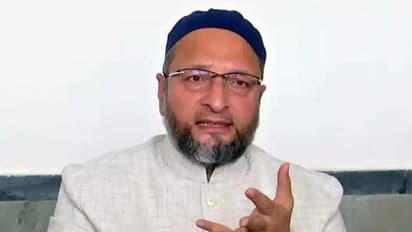Gyanvapi Masjid Case: This will push society back to '80s', says AIMIM chief Asaduddin Owaisi

Synopsis
Asaddudin Owaisi admitted that everything he had feared was unfolding in front of his eyes and that the Varanasi court's decision would cause discord and a slew of similar lawsuits.
All India Majlis-e-Ittehadul Muslimeen (AIMIM) chief Asaddudin Owaisi challenged the Varanasi court's ruling, which allowed Hindu worshippers seeking permission to offer prayers to Hindu deities at the Gyanvapi Masjid complex on Monday. Owaisi expressed concern about what was happening in the country, implying that the order was invalid and that the Anjuman Islamia Masjid Committee's plea should not have been rejected.
Asaddudin Owaisi is a qualified advocate, the AIMIM shared 'Barrister' Owaisi's press conference on the Gyanvapi Masjid case. Owaisi admitted that everything he had feared was unfolding before his eyes and that the Varanasi court's decision would result in discord and a series of similar lawsuits.
"Now, following today's (Varanasi court's) order, a new cycle of litigation will begin," Owaisi said, noting that the development would push society back to the '1980s and 1990s.'
"God forbid, if we return to the '1980s and 1990s,' destabilisation will reign," said the AIMIM chief. Contrary to district judge Ajay Krishna Vishvesh's order allowing the suit's maintainability, the AIMIM stated that he hoped the Varanasi court would handle the case differently.
"I thought they'd deal with the suit as they say in English, nip it in the bud," Owaisi said, "but now I feel like the course of the trial will develop like it did in the Babri Masjid case."
In a press conference, the senior politician referred to documents and submissions from the Muslim side, seemingly determined to correct the Gyanvapi Masjid case in favour of the mosque committee. He challenged the court's decision, in which Judge Vishvesh ruled that the Places of Worship Act do not bar the suit filed by Hindu petitioners.
Owaisi stated, "What is the significance of the Act on Places of Worship? The Supreme Court ruled in the Babri Masjid case that the status quo must be maintained after August 15, 1947. However, they now claim that the Act does not bar the matter. Now, watch how the number of cases on the subject grows."
This came after the court ruled that the Act imposed no bar on the suit claiming the right to worship idols installed in the endowment, within the temple premises, or outside. According to Judge Vishvesh, the defendants, i.e. the mosque committee, failed to demonstrate that the plaintiff's suit was barred by the Uttar Pradesh Sri Kashi Vishwanath Temple Act, 1983.
"How will it affect the country? The aftermath will be such that destabilising effects will be on the rise," Owaisi added.
The AIMIM chief stated that the Muslim side would now appeal to the Supreme Court but that the order, which was issued earlier today, would not destabilise the country and would not result in several cases similar to the Gyanvapi Masjid case.
Also Read: Gyanvapi mosque: Hindus claim 'shivling' found, Muslims say it's a fountain
Also Read: 'Baba mil gaye', claims Hindu side as Gyanvapi mosque survey ends
Stay updated with the Breaking News Today and Latest News from across India and around the world. Get real-time updates, in-depth analysis, and comprehensive coverage of India News, World News, Indian Defence News, Kerala News, and Karnataka News. From politics to current affairs, follow every major story as it unfolds. Get real-time updates from IMD on major cities weather forecasts, including Rain alerts, Cyclone warnings, and temperature trends. Download the Asianet News Official App from the Android Play Store and iPhone App Store for accurate and timely news updates anytime, anywhere.